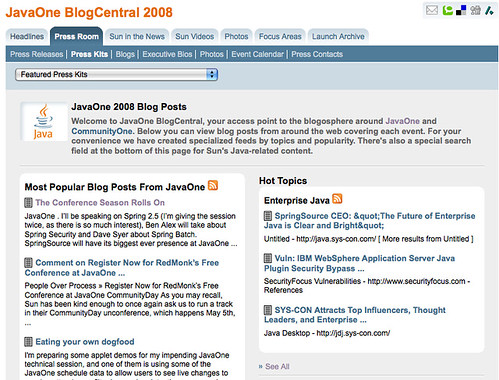 Super-cookie service MyBlogLog just emailed users to let us know about a new “friend finder” the site is offering. The feature is remarkable because it makes it really easy to add your friends from around the web – without asking you for any passwords! With just a few clicks your friends on services from Flickr to FriendFeed can become your friends on MyBlogLog. I wish everyone did that. Here’s a few bullet points on the implementation that could be helpful for other application developers to consider.
Super-cookie service MyBlogLog just emailed users to let us know about a new “friend finder” the site is offering. The feature is remarkable because it makes it really easy to add your friends from around the web – without asking you for any passwords! With just a few clicks your friends on services from Flickr to FriendFeed can become your friends on MyBlogLog. I wish everyone did that. Here’s a few bullet points on the implementation that could be helpful for other application developers to consider.
- This doesn’t just work with early adopters. Most services have you “add friends” by asking for your email password because that’s where most of the online world has most of its friends. It’s creepy though and a bad practice to do that. MyBlogLog can grab the “Friend of a Friend” (FOAF) data from your public profiles at services like Flickr, Facebook and MySpace – hardly a tiny set of bleeding edge users. Your application could consider doing the same. Think also about using the new GMail contacts API.
- There’s still no “add all” link. In what I assume was a silly oversight, there’s no link to “add all” when you pull up your friends from these networks. You have to add them one at a time. It would be nice to be able to select all and then deselect a few. That’s no small thing, it would make a big difference in growing the service and I assume they will fix that soon. As it is, the list of 20 friends at a time gets mixed up a bit like FriendFeed recommendations. Implementation of both are clunky though and could scale much better by presenting more options at once and displaying more information about users you are prompted to add as friends.
- Service discovery could be faster. MyBlogLog is “discovering friends” via the public profile pages you filled out in your MBL profile. That process presents you with a long list of services from around the web and asks you to fill in the part of profile URLs where your username goes. Everyone should check out how Lijit discovers new accounts from other sites. It asks you “what is your most common username” and then searches to see where it can find an account with that username. You then confirm or deny each one and can enter exceptions to your standard username on any particular service. It’s really smooth and smart. I wish MyBlogLog and everyone else did it that way.
Almost every service on the web wants to connect users with their friends elsewhere, for aggregate activity feed displays or “viral introductions.” There are some best practices emerging for doing that, though. Companies looking to implement such features should take a look at oAuth and at Niall Kennedy’s recent post on user authentication best practices. If you want to see something cool about MyBlogLog, I’d also recommend checking out the BlogJuice bookmarklet. You’ll like it, I promise.

 I’m excited to unveil my latest consulting project, a fairly extensive RSS-based microsite put together with
I’m excited to unveil my latest consulting project, a fairly extensive RSS-based microsite put together with 